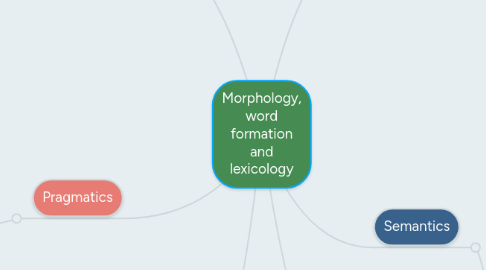
1. Lexicology
1.1. It deals with vocabulary of the language and the property of words as basic units of the language.
1.1.1. Task of lexicology
1.1.1.1. Is to give systematic description of the English vocabulary, its etymological peculiar features and its classifications.
1.1.1.2. to study the rules of enriching the vocabulary
1.1.2. Types of lexicology
1.1.2.1. General lexicology
1.1.2.2. Special lexicology
1.1.2.3. Contrastive lexicology
1.1.2.4. Historical lexicology
1.1.2.5. Descriptive lexicology
2. Pragmatics
2.1. It is the study of "how to do things with words"
2.1.1. Speech acts
2.1.1.1. It differs certain kinds of acts
2.1.1.1.1. Direct
2.1.1.1.2. Indirect
2.1.2. Rethorical structure
2.1.3. Conversational implicature
2.1.3.1. Cooperative Principle
2.1.3.1.1. maxim of quality
2.1.3.1.2. maxim of quantity
2.1.3.1.3. maxim of relevance
2.1.3.1.4. maxim of manner
2.1.4. Management of reference
3. Resources:
3.1. Ohio Estate University, 2016, Morphology, Retrieved from http://www.ling.ohio-state.edu/~kdk/201/autumn01/slides/morphology-4up.pdf
3.2. Rodney Huddleston, 2002, The University of Queensland, Retrieved from http://www.lel.ed.ac.uk/grammar/overview.html
3.3. Мысли вслух, 2015, Lexicology, Retrieved from http://thinkingout.ru/lex-bilet1.php
3.4. Penn University, 2016, Linguistics 001, Retrieved from http://www.ling.upenn.edu/courses/Fall_2007/ling001/pragmatics.html
4. Morphology
4.1. It is the study of the basic building blocks of meaning in language
4.1.1. Free
4.1.1.1. roots
4.1.2. Bound
4.1.2.1. prefixes: un-happy, re-write, pre-view
4.1.2.2. b. suffixes: writ-ing, quick-ly, neighbor-hood
4.1.2.3. c. infixes: (very rare in English) speech-ometer
4.1.3. Derivational
4.1.3.1. happiness ← happy + ness; preview ← pre + view.
4.1.4. Inflectional
4.1.4.1. cats ← cat + s; cooler ← cool + er.
4.1.5. Cranberry
4.1.5.1. permit, commit, submit
4.1.6. Content
4.1.6.1. car, -able, -un.
4.1.7. Function
4.1.7.1. and, plural -s
